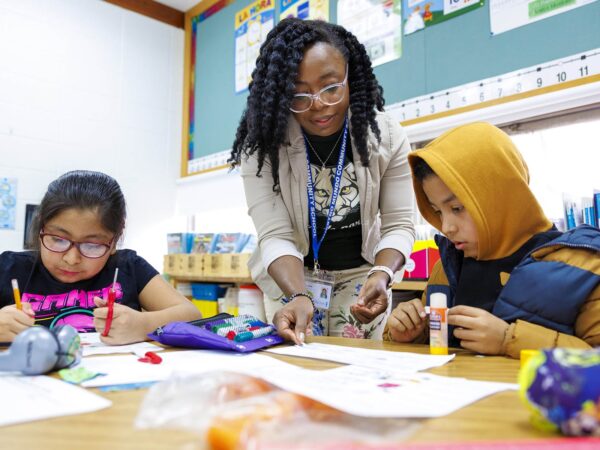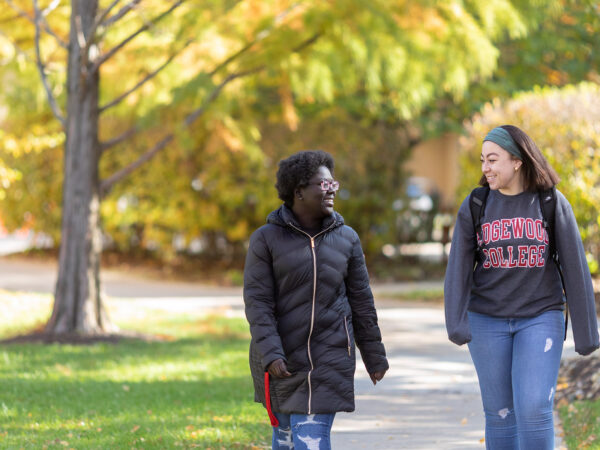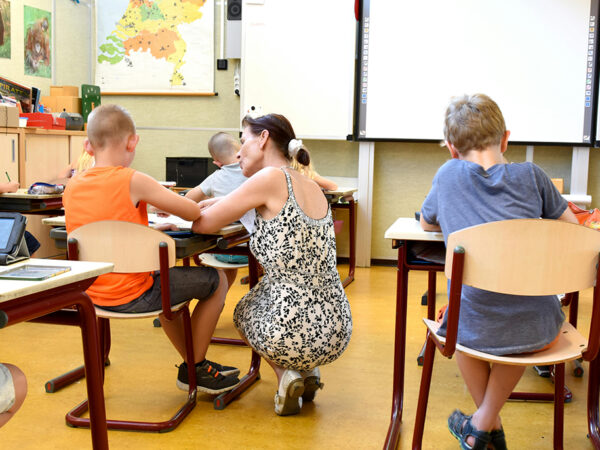Bachelor of Arts in 4-12 Secondary Education – Degree CompletionHenry Predolin School of Nursing, Business, Education, and Health Sciences
Finish Your Degree,
Launch Your Teaching Career
Designed for Working Adults
If you’re ready to inspire the next generation of learners and make a difference in your community, Edgewood College’s Bachelor of Arts in Secondary Education Degree Completion program is your pathway to becoming a licensed educator. Designed for adults looking to finish their bachelor’s degree, this program prepares you to teach grades 4-12 in subject areas like mathematics, social studies, and English. Whether you’re already working as a paraprofessional or pivoting into a new career in education as an adult learner, this program provides the tools and flexibility to help you achieve your academic and professional goals.
With a schedule tailored to the needs of working adults, general education courses are available in accelerated, hybrid, and virtual formats with minimal on-campus requirements. Courses in the major are delivered as asynchronous, 8-week sessions, allowing you to study on your own time while staying on track with structured lessons and deadlines. Complete your initial licensure sequence in as few as 39 credits, including hands-on clinical field experiences and a full-time student teaching semester. Join a community dedicated to your success, where your professional growth and passion for education shape a brighter future.
Licensure Concentrations:
Students pursuing a secondary education degree must also fulfill content knowledge requirements by completing a major (or a 35-credit equivalent) in their chosen licensure area:
- English Teaching
- Mathematics Teaching
- Broad Field Social Studies Teaching
Paraprofessional to Teacher
This pathway is designed for students who are 22 years of age or older or four years post high school graduation/GED achievement. The typical student will have completed some college coursework, allowing them to build on their previous education for a faster path to degree completion. Ideally, applicants should have a minimum of 24 college credits to help accelerate their academic journey. Alternatively, full time school district employment or having a contract to begin full time work at a school district can also qualify students for admission. For those just starting their college journey and without professional experience, Edgewood College offers a variety of undergraduate programs that provide a more suitable starting point.
Madison, WI
Hybrid
120
Careers within Secondary Education
$60,560
Average annual salary for a Secondary Education Teacher
A bachelor’s degree in special education prepares you for a variety of career paths. Careers with an asterisk (*) may require additional education.
- Career Counselor*
- English as a Second Language (ESL) or Bilingual Education Teacher*
- High School Teacher
- Instructional Coordinator*
- Intermediate School Teacher
- Middle School Teacher
Featured Courses
Degree Completion Education 270 Secondary Literacy
This course introduces content area literacy theories and practices, grounded in the concept that every secondary teacher is a teacher of literacy. Candidate teachers will study what literacy is and how literacy practices are specialized for specific environments, content areas, and students, including multilingual learners. The course will demonstrate how literacy instruction is essential for students to develop core content proficiency through exploring the transition from an elementary “learning to read” focus to the “reading to learn” focus of grades four through twelve; the interconnectedness of reading, writing, and thinking and the need to explicitly provide modeling for each to support student success; and diverse resources, strategies, and approaches to differentiation to support all students.
Degree Completion Education 294 Secondary Methods I
This course provides aspiring educators with knowledge, skills, and experiences to develop and deliver effective instructional programs aligned with content area standards for students in grades four through twelve. Candidate teachers will explore theories and practices of curriculum planning and instructional design, including strategies for integrating technology across the curriculum. Students will work with a pedagogical content mentor in their licensure area – English language arts, math, science, or social studies.
Degree Completion Education 309 Curriculum Planning
A study of curriculum design and planning at the secondary levels with emphasis on inclusive content area curriculum development, assessment, and grading. Topics include curriculum design, Universal Design for Learning, Wisconsin standards, content area standards, meaningful assignments, meaningful balanced assessment for learning, differentiation, accommodation, grading, and delivery of instruction. This course satisfies PI 34.022(1), cooperative marketing and consumer cooperatives, for candidates seeking licensure in social studies. Students will work with a pedagogical content mentor in their licensure area – English language arts, math, science, or social studies.
Student Organizations
Aspiring Teachers Club
The Aspiring Teachers Club welcomes all students enrolled in, or preparing to study, in the Division of Education at Edgewood College. Their mission is to prepare students for careers in education by providing members with opportunities to enhance their understanding of the profession. They accomplish this by engaging members with opportunities to participate in professional development and community service activities, both on– and off-campus. Their commitment extends to fostering a warm, inclusive, and fun environment, creating a vibrant student community within the Division of Education.
Accreditation
The Teacher Education licensing programs are approved by the Wisconsin Department of Public Instruction (WDPI). Edgewood College is accredited by the Higher Learning Commission.
A Tradition of Excellence in Educating Educators
At Edgewood College, education has always been at the heart of our mission. Since granting our first BA in Education degrees in 1940, we’ve built a reputation of preparing exceptional educators. Today, we continue this legacy by expanding opportunities for paraprofessionals to achieve their professional goal of becoming licensed teachers. This effort not only fosters educational equity but also increases the diversity of teachers in classrooms, aligning with our vision to create equity in education.
Faculty Spotlights

Donna Vukelich-Selva
Associate Professor | School of Education
Donna Vukelich-Selva received her Ph.D. in the Department of Curriculum and Instruction at the University of Wisconsin-Madison in 2011. She also holds a Master of Arts in Latin American, Caribbean and Iberian Studies from UW-Madison. Before coming to Edgewood College in 2008, she taught at a K-12 bilingual school in Managua, Nicaragua, where she also founded and ran a study abroad program for US college students. Vukelich-Selva teaches both undergraduate courses in the Division of Education, as well as bilingual and ESL education graduate courses in the Language and Literacy program. She also teaches in Edgewood’s COR program for first year students and piloted a course on the history of immigration in the United States that is cross-listed with Ethnic Studies. Among her college responsibilities, Donna serves on the advisory board for Edgewood’s Center for Multicultural Education. Donna’s research interests include critical race theory, education and immigration, bilingual education and restorative justice. She has been active in the Madison community for many years.
DVukelich-Selva@edgewood.edu
(608) 663-3235
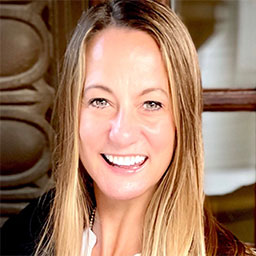
Tamara Mouw
Assistant Coordinator of Language and Literacy
Tamara Mouw, M.H.R., M.Ed., is a systems-level, equity-focused innovative instructional leader. She has served as a high school English teacher, an instructional coach, and an administrator in curriculum and instruction where she led district-wide professional learning in literacy. Tamara is currently serving as Director of Partnerships and Equitable Practices at the Wisconsin Department of Public Instruction where she enacts an anti-bias, antiracist approach to creating just and equitable learning environments.
tmouw@edgewood.edu
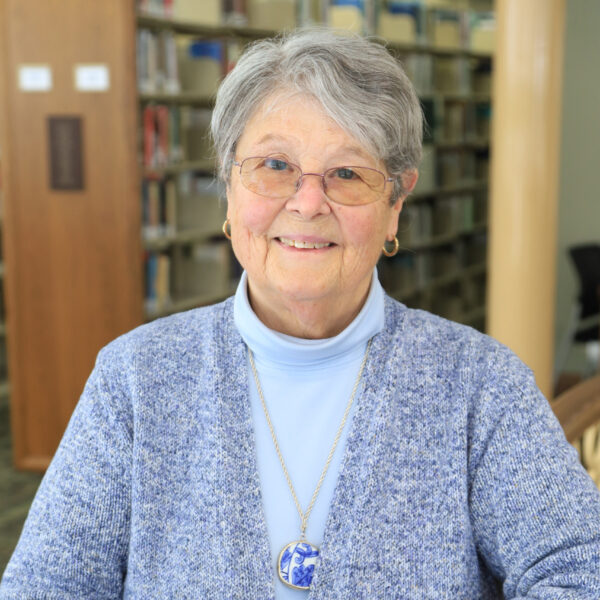
Joan Lampert
Senior Adjunct Instructor
jlampert@edgewood.edu
Shaping the Future of Education
ESL and Bilingual Add-Ons
Our program is rooted in the belief that paraprofessionals bring valuable, real-world classroom experience that can be harnessed to strengthen K-12 education. Our approach integrates their current roles into their educational journey, allowing them to fulfill clinical practicum requirements through their ongoing work in schools. With options to pursue licensure in English as a Second Language (ESL) or Bilingual Education, the pathway prepares candidates to meet the growing needs of diverse student populations while opening new career opportunities for themselves.
Student Teaching: Expand Your Skills
Madison and its neighboring communities offer a diverse array of practicum and student teaching placements, including private, parochial, and public schools in both urban and suburban areas. Having diverse options provides you with a broader range of experiences, which facilitates exploration to help you discover the best fit, enhancing both your skills and marketability.
Empowering Educators for Equity and Inclusion
The Division of Education mission is to cultivate future educators dedicated to anti-racist work that embraces and empowers every student. We do this by grounding our work in the core values of Edgewood College and providing teaching that is culturally and linguistically sustaining. This pursuit of equity extends inward, fostering a culture of inclusivity within us, our division, our students, and the communities we influence.
We envision candidates seeking licensure and education degrees as practitioners who are both reflective and effective. Our commitment is to nurture professionals devoted to continuous growth through ongoing professional development, cultivating the knowledge, skills, and dispositions essential for promoting equity in every classroom and school.
Frequently Asked Questions
What if I’m not currently a Paraprofessional?
This program is designed with working paraprofessionals in mind, but it is not a requirement. Full time school district employees or those under contract to begin full time work at a school district
are eligible for admission, regardless of whether they have earned any higher education credits. Adults not in a school district role are also encouraged to apply if they are 22 years of age or older or four years post high school graduation/GED achievement and if they have completed higher education coursework, with a preference for a minimum of 24 credits. We will also consider special situations or circumstances; applicants should address these in a personal statement.
For students just beginning their college journey without prior professional experience, Edgewood College offers a variety of undergraduate programs that provide a more suitable starting point.
How many entry points are available for this pathway?
We’re pleased to offer five entry points throughout the academic year, giving new students flexibility in starting their journey. Please refer to the academic calendar for specific start dates.
- Fall Session I
- Fall Session II
- Spring Session I
- Spring Session II
- Summer Session
Yes, students must maintain a minimum 2.75 GPA to qualify for teacher licensure.
What if I want to teach Special Education?
To earn licensure in Special Education, you’ll complete five additional courses to earn a Special Education Minor. These evening classes follow a 15-week semester schedule, and your Academic Advisor will assist you with integrating them into your academic plan.
I speak another language; can I get a bilingual license?
Yes! To obtain a bilingual license, you’ll complete the ESL K-12 licensure pathway add-on (see above) and then take one additional course and demonstrate proficiency in your target language. Your proficiency is validated through passing the American Council on the Teaching of Foreign Languages (ACTFL) exam during your senior year.
What should I expect during Student Teaching?
Student Teaching is a supervised instructional experience designed to prepare you to meet the academic needs of your students. It spans a full semester (a minimum of 16 weeks), requiring full-time participation (minimum 40 hours per week). You will be actively involved in teaching every day, including two lead weeks in the classroom. If you’re already working in a 4-12 educational institution, your current district can often serve as the clinical site for your student teaching practicum.
What level of support do students receive in this major?
Our Education programs emphasize hands-on learning, with engagement in 4-12 classrooms starting in your sophomore year, supported by experienced practicum teachers. To ensure your success, a dedicated team of instructors, advisors, and administrators is committed to providing direct support throughout your academic journey, with small classes that enable instructors to center on individual needs to guide your progress through the program.
